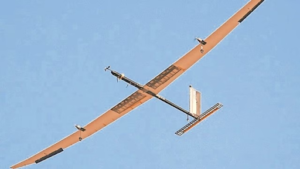
About HAPS:
- HAPS is an advanced solar-powered UAV capable of generating its own solar energy to remain airborne for extended periods, potentially months or years.
- It operates in the stratosphere, at altitudes of 18-20 km, which is significantly higher than commercial airplanes, enabling satellite-like surveillance capabilities.
- Designed for extended surveillance, communication, and scientific missions, HAPS represents a frontier in UAV development.
Need for HAPS:
- Driven by the need for continuous surveillance capabilities, especially along border areas, highlighted by situations like the Doklam standoff in 2017.
- Challenges with battery-powered UAVs and satellites prompted the move towards solar-powered UAVs, offering a more cost-effective solution without the need for expensive rocket launches.
Applications:
- Disaster response, enabling mobile communication networks in remote or affected areas
- They serve as aerial towers, providing more flexibility than satellites for tasks such as detailed land mapping.
Why in News?
- The Council of Scientific and Industrial Research – National Aerospace Laboratories (CSIR-NAL) has achieved a significant breakthrough in UAV technology by successfully testing a High Altitude Pseudo-Satellite (HAPS).
 Profile
Profile Settings
Settings Refer your friends
Refer your friends Sign out
Sign out






